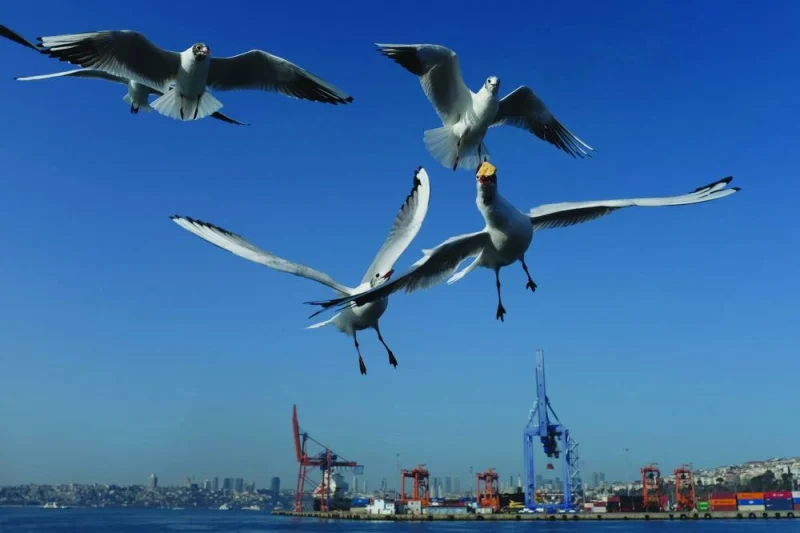Turkiye GDP grows 4.5% in 2023 on strong demand; slowdown seen coming

Seagulls fly over the Bosphorus in Istanbul. Turkiye’s economy grew 4.5% last year and 4.0% in the fourth quarter, data showed on Thursday, beating expectations as strong domestic demand offset the fallout from devastating earthquakes and a slowdown in its main trading partners.
Turkiye’s economy grew 4.5% last year and 4.0% in the fourth quarter, data showed on Thursday, beating expectations as strong domestic demand offset the fallout from devastating earthquakes and a slowdown in its main trading partners.
Growth is expected to slow this year as an aggressive monetary tightening cycle seeks to rein in soaring inflation. Demand had been driven by expectations that inflation will rise, prompting consumer spending ahead of that.
Fourth-quarter gross domestic product (GDP) expanded 1.0% from the previous quarter on a seasonally and calendar-adjusted basis, data from the Turkish Statistical Institute showed.
In a Reuters poll, the economy was forecast to have expanded 4.3% in 2023, very close to the government’s medium-term programme forecast of 4.4%. Fourth quarter GDP growth was forecast to be 3.5%. The economy expanded 5.5% in 2022.
Growth in the third quarter was revised up to 6.1% from 5.9%, the data also showed, reinforcing the strength.
In 2023 the total value added increased by 9.0% in financial and insurance activities, 7.8% in construction and 6.4% in services. Final consumption expenditure of resident households increased by 12.8%. Exports fell 2.7% and imports increased by 11.7% last year, reflecting the lopsided influence of demand.
But Finance Minister Mehmet Simsek said indicators point to a more balanced economy and a lower current account deficit.
“We expect moderate and balanced growth in 2024, with net foreign demand making a positive contribution to growth,” he said in a statement.
The lira — which lost more than 36% of its value against the dollar in 2023 and is 5.3% weaker this year — was little changed at 31.2170 at 0800 GMT.
The economy grew around 4% in the first half of 2023, affected by production disruptions following earthquakes that hit the country’s southeast in February and by the central bank’s low-rates policy before May elections, which encouraged consumers to borrow and spend to get ahead of high inflation.
Since June however, the bank has pivoted policy and gradually hiked its benchmark rate to 45% from 8.5%. Growth is expected to cool off to 2.9% this year as a result of the tighter economic policies, the poll showed.
“I expect 2024 to be a tough year for the Turkish economy particularly after the first quarter. Once the local election cycle is over (after March 31), the monetary and fiscal policies will likely tighten again,” said Selva Demiralp, professor at Istanbul’s Koc University and a former Federal Reserve economist.
“By mid-year, we will taste the full bitterness of the policy medicine,” she said.
Inflation surged to 65% in January and is expected to rise through around mid-year. MIT economist Daron Acemoglu said in an interview this week that the central bank had not tightened policy enough to achieve its disinflation goal.
Growth is expected to slow this year as an aggressive monetary tightening cycle seeks to rein in soaring inflation. Demand had been driven by expectations that inflation will rise, prompting consumer spending ahead of that.
Fourth-quarter gross domestic product (GDP) expanded 1.0% from the previous quarter on a seasonally and calendar-adjusted basis, data from the Turkish Statistical Institute showed.
In a Reuters poll, the economy was forecast to have expanded 4.3% in 2023, very close to the government’s medium-term programme forecast of 4.4%. Fourth quarter GDP growth was forecast to be 3.5%. The economy expanded 5.5% in 2022.
Growth in the third quarter was revised up to 6.1% from 5.9%, the data also showed, reinforcing the strength.
In 2023 the total value added increased by 9.0% in financial and insurance activities, 7.8% in construction and 6.4% in services. Final consumption expenditure of resident households increased by 12.8%. Exports fell 2.7% and imports increased by 11.7% last year, reflecting the lopsided influence of demand.
But Finance Minister Mehmet Simsek said indicators point to a more balanced economy and a lower current account deficit.
“We expect moderate and balanced growth in 2024, with net foreign demand making a positive contribution to growth,” he said in a statement.
The lira — which lost more than 36% of its value against the dollar in 2023 and is 5.3% weaker this year — was little changed at 31.2170 at 0800 GMT.
The economy grew around 4% in the first half of 2023, affected by production disruptions following earthquakes that hit the country’s southeast in February and by the central bank’s low-rates policy before May elections, which encouraged consumers to borrow and spend to get ahead of high inflation.
Since June however, the bank has pivoted policy and gradually hiked its benchmark rate to 45% from 8.5%. Growth is expected to cool off to 2.9% this year as a result of the tighter economic policies, the poll showed.
“I expect 2024 to be a tough year for the Turkish economy particularly after the first quarter. Once the local election cycle is over (after March 31), the monetary and fiscal policies will likely tighten again,” said Selva Demiralp, professor at Istanbul’s Koc University and a former Federal Reserve economist.
“By mid-year, we will taste the full bitterness of the policy medicine,” she said.
Inflation surged to 65% in January and is expected to rise through around mid-year. MIT economist Daron Acemoglu said in an interview this week that the central bank had not tightened policy enough to achieve its disinflation goal.





